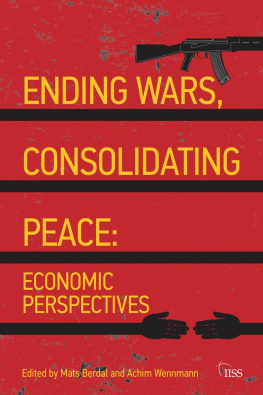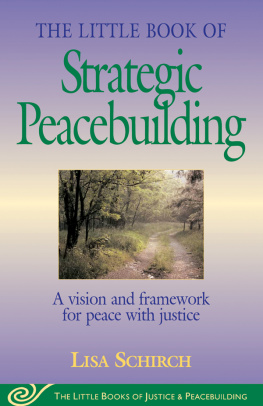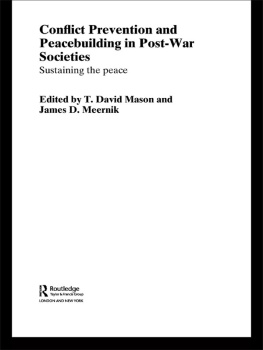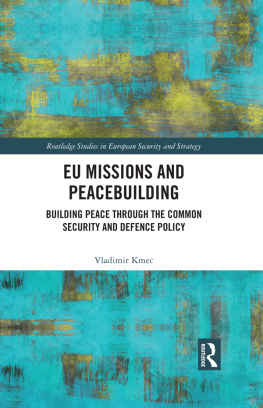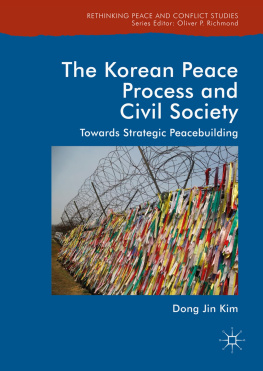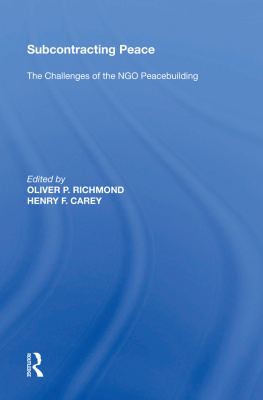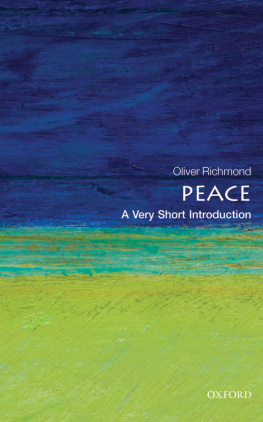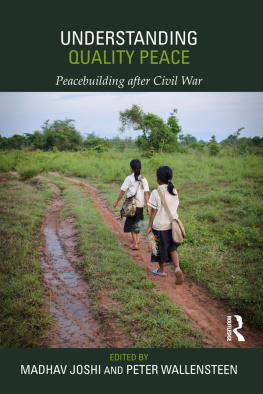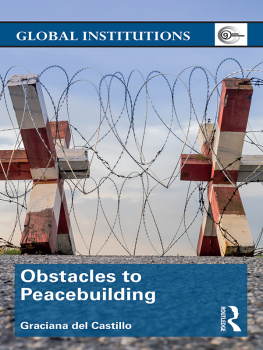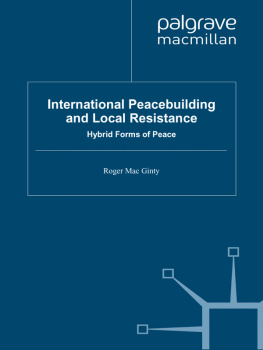Ending Wars,
Consolidating Peace:
Economic Perspectives
Edited by Mats Berdal and Achim Wennmann
Ending Wars,
Consolidating Peace:
Economic Perspectives
Edited by Mats Berdal and Achim Wennmann
The International Institute for Strategic Studies
Arundel House | 1315 Arundel Street | Temple Place | London | WC2R 3DX | UK
First published September 2010 by Routledge
4 Park Square, Milton Park, Abingdon, Oxon, OX14 4RN
for The International Institute for Strategic Studies
Arundel House, 1315 Arundel Street, Temple Place, London, WC2R 3DX, UK www.iiss.org
Simultaneously published in the USA and Canada by Routledge
270 Madison Ave., New York, NY 10016
Routledge is an imprint of Taylor & Francis, an Informa Business
2010 The International Institute for Strategic Studies
DIRECTOR-GENERAL AND CHIEF EXECUTIVE John Chipman
EDITOR Tim Huxley
MANAGER FOR EDITORIAL SERVICES Ayse Abdullah
ASSISTANT EDITOR Janis Lee
COVER/PRODUCTION John Buck
The International Institute for Strategic Studies is an independent centre for research, information and debate on the problems of conflict, however caused, that have, or potentially have, an important military content. The Council and Staff of the Institute are international and its membership is drawn from almost 100 countries. The Institute is independent and it alone decides what activities to conduct. It owes no allegiance to any government, any group of governments or any political or other organisation. The IISS stresses rigorous research with a forward-looking policy orientation and places particular emphasis on bringing new perspectives to the strategic debate.
The Institute's publications are designed to meet the needs of a wider audience than its own membership and are available on subscription, by mail order and in good bookshops. Further details at www.iiss.org.
Printed and bound in Great Britain by Bell & Bain Ltd, Thornliebank, Glasgow
All rights reserved. No part of this book may be reprinted or reproduced or utilised in any form or by any electronic, mechanical, or other means, now known or hereafter invented, including photocopying and recording, or in any information storage or retrieval system, without permission in writing from the publishers.
British Library Cataloguing in Publication Data
A catalogue record for this book is available from the British Library
Library of Congress Cataloging in Publication Data
ADELPHI series
ISSN 0567-932X
ADELPHI 412413
ISBN 978-0-415-61387-3
Contents
ACKNOWLEDGEMENTS
Dedicated to the memory of Karen Ballentine, who made a great contribution to the study of the economic aspects of peacebuilding.
This book grew out of a two-year research programme at The International Institute for Strategic Studies on Economics and Conflict Resolution. The editors wish to thank The Portland Trust for its generous support of this research programme. We would also like to thank participants in two roundtable meetings held in Washington DC and London in 2009 for their intellectual contribution to the programme.
Mats Berdal and Achim Wennmann, London, August 2010
Introduction
Mats Berdal
For every complex problem, there is a solution that is simple, neat, and wrong.
Attributed to H.L. Mencken
The record of international efforts to assist countries emerging from war in the post-Cold War era is, by any measure, distinctly uneven. A major reason for this, as several of the contributions to this volume make clear, lies in the recurring failure of those charged with peacebuilding and reconstruction activities however benign and well-meaning their intentions to treat societies emerging from violence and war on their own terms. In part, this failure is linked to an all-too-common lack of understanding and sensitivity towards the cultural and historical specificities of war-torn societies. At least as important, however, has been the failure of outsiders to recognise the dynamic and complex ways in which the conditions of war and violent conflict themselves affect and reshape societies, and, in doing so, how they generate distinctive political, economic and development challenges that do not lend themselves to templated solutions or business-as-usual approaches to economic recovery. While zones of protracted conflict are often described in terms of anarchy and lawlessness, individuals and communities are never merely passive victims in the face of state failure and collapse.
Of necessity, many will strive to find ways of surviving and coping during conflict, sometimes displaying great ingenuity, entrepreneurial skill and initiative in the process. Others will develop a vested interest in the continuation of armed conflict, not just for the purposes of survival but also for the cover it usefully provides for predatory and criminal activity, a point developed more fully by James Cockayne in the present volume. The result of these adaptations, by a range of local and external actors, to the realities of war and conflict is a distinctive political economy based on violence that persists into the post-war period. And precisely because it persists, it needs to be understood as ground reality by those engaged in peacebuilding and reconstruction. That reality is not, however, fixed or static. As an earlier and pioneering Adelphi Paper on the economic functions of violence in civil wars put it, war-to-peace transitions are rarely smooth or clear cut but involve instead a realignment of political interests and a readjustment of economic strategies rather than a clean break from violence to consent, from theft to production, or from repression to democracy.
What these considerations make clear is that progress in the peacebuilding field is not only a function of political commitment and staying power, appropriately matched by resources, on the part of outsiders. While those factors are often vital to success, they are not sufficient. Indeed, they will count for little if they are not accompanied by analytical and conceptual clarity about the challenges that need to be tackled. It is with respect to this latter requirement that is, for a deeper understanding of war-torn societies and war-to-peace transitions that this collection of essays seeks to contribute. However, acquiring such an understanding, as several of the contributors emphasise, does not necessarily make the policy challenges and choices confronting peacebuilders any easier. Indeed, in many cases improved understanding only serves to highlight the trade-offs that often exist between short-term objectives aimed at stabilising fragile and delicate post-conflict environments and longer-term objectives relating to the promotion of justice, balanced economic growth and the building of institutions, all critical to lasting peace and stability. In terms of the overall focus of the present volume that is, the economic dimension of peacebuilding short-term demands for security and stability may well require some form of engagement with informal, often illiberal, power structures as a necessary step in a longer process designed to wean an economy away from violence and crime, and towards peaceful, legitimate economic activity.
Linking analysis and policy: the debate on state failure
The point here, one that also serves to bring out the overall intention behind the book, is well illustrated by the debate surrounding, and the international policy response to, state failure and state fragility. It is a subject that is addressed in several of the essays below, notably by Robert Muggah, James Cockayne and Jennifer Hazen. The most explicit treatment of the subject, however, is by Ken Menkhaus who starts out with a depressing paradox: despite [the] prominent place failed states have assumed in global security, few international security problems since the end of the Cold War have been so misunderstood as state failure. In a passage that neatly and clearly brings home the importance of basing policy on sound and empirically sustainable analysis, he notes the dominant assumption that the problem of state failure is low capacity:

